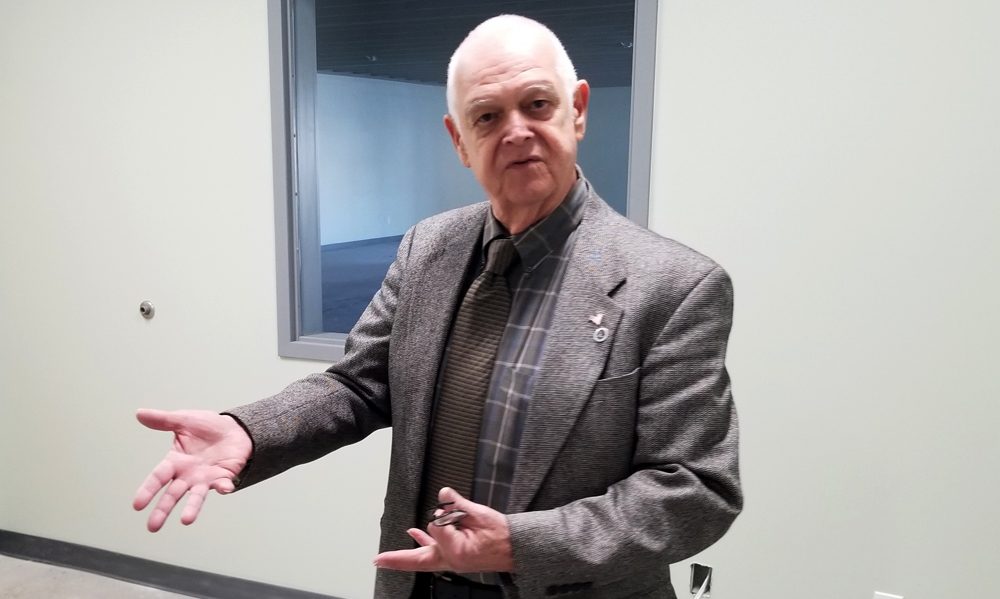 Incumbent Mayor Ron Verini discusses the upcoming November election at the Veteran Advocates of Ore-Ida in Ontario. (The Enterprise/Pat Caldwell)
Incumbent Mayor Ron Verini discusses the upcoming November election at the Veteran Advocates of Ore-Ida in Ontario. (The Enterprise/Pat Caldwell)
ONTARIO – An initiative to allow retail sales of marijuana in Ontario is the central issue in the upcoming election and could set the course for Ontario into the next decade.
That was the opinion of four local officials as city voters began returning ballots.
Mayor Ron Verini, who will step down from his post Jan. 1, said the election is important.
“I think the only other election I would say was probably as important, or even a bit more important, was the 1 percent sales tax,” said Verini.
John Breidenbach, president and chief executive officer of the Ontario Chamber of Commerce, agreed.
“This election is vital to our community and what the future looks like,” said Breidenbach.
That’s because of the marijuana initiative as well as the number of candidates running for city council and the mayor’s slot, he said.
“Any time you have a mayor’s seat changing and that many council seats up for grabs at the same time, it is important,” said Breidenbach.
The unpaid mayor’s seat is being sought by developer Riley Hill, Realtor and city councilor Marty Justus, and two retirees, Billy Carter and Frank Griffith.
Each candidate conveys a unique vision for Ontario.
Hill said he wants “transparency and I want the public to know what is really going on.”
Carter said if he is elected mayor he will beef up city finances with a fee on merchants that own a business in Ontario but live outside city limits.
Griffith said he would tackle Ontario’s financial challenges with a plan to “downsize city government,” while Justus said he wants to change how elected leaders cooperate with City Manager Adam Brown.
“I think the council needs to bring issues to the city manager,” said Justus. The position of mayor is important, Verini said, not because of the power – the mayor has just one vote as does each council member – but because of what the title represents.
“It is the power of the pulpit. The mayor is the face of the council,” said Verini.
Breidenbach said another important decision voters must make is whether to support a measure to create a new recreation district.
How the council will set the course of the city depends on how the community votes on the marijuana initiative, said Verini.
“If the community votes against marijuana you have council members was well as mayoral candidates running who are against retail sales of marijuana,” said Verini. “And I would think they would vote in conjunction with each other.”
The reverse is true, too, said Verini.
“You have those on the council, as well as one outspoken mayoral candidate, that are pro-dispensaries, pro-retail sales,” said Verini.
Verini said “either selection that the city votes on will set the direction for our community.”
“If they vote, obviously, for marijuana dispensaries you will have the added responsibility as a community, a police force and a fire department to keep our city safe because of the number of people who will be coming in,” said Verini.
Breidenbach said the marijuana initiative is important because “if it passes, it changes the whole dynamic of our community.”
“If it goes down, the question will be how many more times it will come back,” said Breidenbach.
Shawna Peterson, an Ontario resident and chair of the Eastern Oregon Border Economic Development Region Board, said voters confront an opportunity to make change. The border board consisting of seven local people was created by the 2017 Legislature to stimulate economic development.
“The rec district, the mayor’s race and the pot ban all will plot a course for the future of Ontario,” said Peterson.
Peterson said the number of candidates running for office is good.
“We haven’t had that in the past. I do think there is a lot of apathy in Ontario. So, it is nice to see so many candidates,” said Peterson.
Verini urged residents to do their part no matter their politics.
“If you get out to vote it will make a difference as what our community looks like five and ten years down the road,” said Verini.
Norm Crume, city council president, said he is pleased voters get a say on the marijuana initiative.
“Having the people vote on it is the best thing that can happen. The result will be good. The community will get what it voted for,” said Crume.
Verini said the key questions for the community in this election are straightforward.
“Do we want a safe community? What does it take to have a safe community? Does it take more police? Less police? Does it take marijuana dispensaries, or not take marijuana dispensaries?” said Verini.




